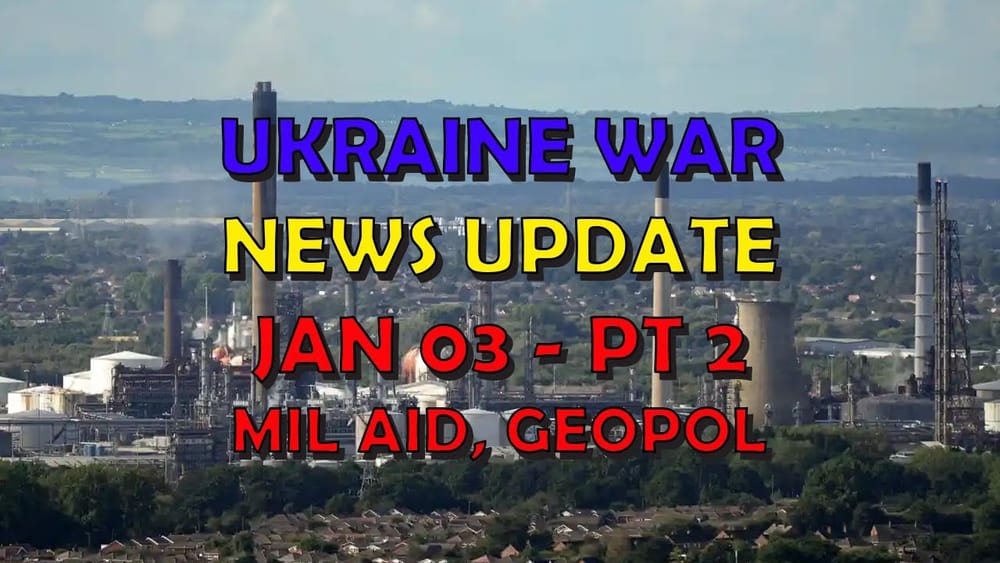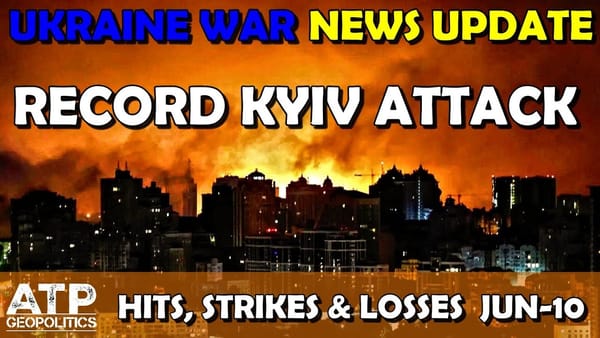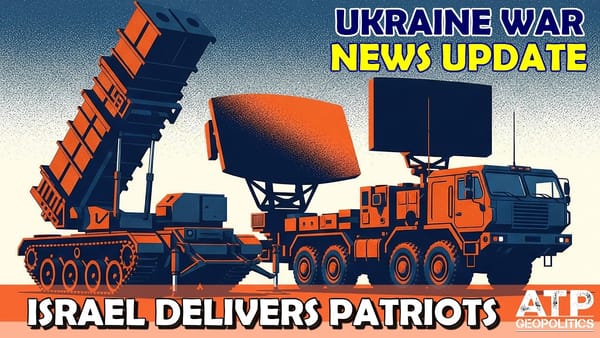Ukraine War Update NEWS: Military Aid & Geopolitical News
Table of Contents 📖
"If America can't fund it and Trump gets in, well, that's the end of the American empire, essentially."
Hello Team
🎦 00:00-00:23⏩
Jonathan greets viewers and introduces the video as the second part of the Ukraine war news update for January 3rd, 2024. He jokes that he hasn't had his second cup of tea yet because his commitment to his audience comes first.
Return to top⤴️
Poland's Call for Long-Range Missiles for Ukraine
🎦 00:23-01:17⏩
- The Polish foreign minister calls for the transfer of long-range missiles to Ukraine, enabling them to target Russian missile and drone launch sites directly.
- This message is echoed by other figures in response to Russia's attacks on Ukrainian cities.
- The Polish foreign minister suggests tightening sanctions on Russia to limit its access to smuggled components for new weapons.
France's Military Aid Package to Ukraine for 2024
🎦 01:17-05:09⏩
Jonathan lists French military aid pledged to Ukraine for 2024, emphasizing that while France may not publicize its contributions widely, it is doing more than some realize.
- He questions whether France is doing enough and compares it to the aid contributions of smaller nations like Estonia and Denmark, citing an analysis by a Russian economist, Ilarionov.
- The analysis highlights that if the US contributed aid at the same rate as Estonia (1% of GDP), it would equate to $270 billion.
- Jonathan emphasizes that assessing aid contributions solely on face value can be misleading, as smaller nations like Denmark are demonstrating significant generosity relative to their size.
Germany: Calls for Taurus Missiles & Tank Repair Delays
🎦 05:09-06:13⏩
- A German MP demands expedited F-16 deliveries to Ukraine, Taurus missiles, and faster repairs for German-supplied tanks currently out of commission due to a shortage of spare parts.
- This highlights a concerning logistical bottleneck, limiting Ukraine's operational capacity.
Czech Republic, Denmark & UK Military Aid to Ukraine
🎦 06:13-08:25⏩
- Jonathan commends the Czech Republic for supplying 26 Dana M2 self-propelled howitzers to Ukraine.
- He also highlights Denmark's donation of a Hydrama 910 demining vehicle to Ukraine.
- Ukrainian border service units are being reinforced with ZU-23-2 anti-aircraft guns, which have proven effective against cruise missiles.
- Zelensky thanks the UK for their contribution to Ukrainian air defense, particularly their provision of radar systems, advanced anti-drone systems, and missiles in response to the recent barrage of Russian missiles and drones.
Analysis: Russia's Dwindling Missile Stockpiles
🎦 08:25-10:20⏩
Jonathan reiterates his analysis from the previous video, pointing to the recent downing of a KH-101 missile manufactured in late 2023 as evidence of Russia's dwindling missile stockpiles.
- He argues that using newly produced missiles instead of older stock suggests a shortage.
- He further supports this claim by highlighting the infrequent and sporadic nature of recent Russian missile attacks, including a wave of 35 drones not followed by missiles.
- He reasons that if Russia had ample missile stockpiles, they would have launched them after the drones to capitalize on the depletion of Ukrainian air defenses.
Turkey Blocks UK Mine Hunters Destined for Ukraine
🎦 10:20-14:05⏩
- Turkey has blocked two UK Royal Navy minehunter ships from passing through the Bosporus Straits to reach Ukraine, citing the 1936 Montreux Convention.
- This convention grants Turkey control over the straits and prohibits warships of belligerent nations from passing through during wartime.
- Jonathan explains that this convention has been crucial in preventing a larger naval escalation in the Black Sea, as it prevented Russia from deploying its full fleet there.
- He acknowledges the frustration expressed by some, including Ukraine Battle Map, who accuse Turkey of aiding Russia and supporting terrorism.
- He notes Turkey's complex relationship with both sides, including their provision of Bayraktar drones to Ukraine, while acknowledging their financial ties and trade with Russia.
- Jonathan introduces an alternative perspective from a previous guest on his channel, Exit 2266.
- Exit suggests the UK and Ukraine may not have formally requested passage for the ships and that Turkey's public announcement of the blockage could be a strategic move to appease Russia without actually siding with them.
- Exit also notes the impracticality of deploying the unarmed minehunters in the Black Sea, as they would be vulnerable to attack by the Russian Navy.
Interview: Patrick Berry on US Military Aid for Ukraine
🎦 14:05-26:19⏩
- Jonathan pivots to a Times Radio interview with Patrick Berry, a former UK soldier and current security lecturer at the University of Bath.
- Berry discusses the importance of securing long-term US military aid for Ukraine, emphasizing that Putin's strategy hinges on outlasting Western support.
- He argues that President Biden should push for a multi-year aid package extending to 2026, effectively ringfencing funds and preventing future administrations from pulling back support.
- Berry contends that the alternative—a potential reduction or halt in US funding, especially if a figure like Trump returns to power—could have dire consequences for Ukraine and signal the decline of US global leadership.
- He acknowledges the growing skepticism among the American public regarding continued aid to Ukraine. He emphasizes the importance of clear messaging to the American people, highlighting the long-term economic and strategic benefits of supporting Ukraine.
- He argues that maintaining the US's position as a global power requires overseas investment and framing support for Ukraine as a worthwhile investment in US national interests.
- Berry criticizes attempts to link domestic issues like border security to foreign policy matters like aid to Ukraine, arguing that they are separate issues that can be addressed independently.
- He highlights the fallacy of connecting the two, pointing out that the US has a long history of supporting initiatives abroad while facing domestic challenges.
- He expresses frustration with politicians who conflate these issues for political leverage.
- Jonathan echoes Berry's frustration, reiterating that connecting such unrelated issues is a tactic used for political gain.
- He emphasizes that the US needs to prioritize investments that maintain its global standing and that supporting Ukraine is paramount in the current geopolitical climate.
- Berry discusses the impact of potential delays in US military aid, highlighting the strain on Ukraine's resources and the risk of territorial losses if long-term support is not secured.
- He suggests that without sustained aid, Ukraine may be forced to transition from conventional warfare to insurgency, depending on Russia's objectives.
- Jonathan and Berry analyze the EU's commitment to supply 1 million artillery shells to Ukraine, with Berry expressing concern over their failure to meet the target.
- Jonathan offers a more optimistic perspective, pointing to increasing production rates and suggesting that the EU might still achieve its goal.
- He praises the US for ramping up its artillery shell production, highlighting the difference between state-owned and privately owned arms manufacturers.
- He argues that the US, with its state-owned facilities, can prioritize production increases for geopolitical reasons rather than solely focusing on profit margins, which is a significant advantage over the EU's reliance on private companies with different priorities.
- Jonathan underlines the importance of long-term manufacturing contracts to incentivize private companies to invest in increased production capacity, something EU governments have been hesitant to do, further explaining the disparity in output between the US and the EU.
Latvia's President Calls for Increased Western Action
🎦 26:19-27:25⏩
Jonathan highlights Latvian President Egils Levits's statement urging the West to "get serious" and increase support for Ukraine following a new wave of Russian airstrikes on Kyiv.
- He points out that while such calls to action are easy to make, following through requires concrete commitments, especially for countries facing complex internal political landscapes.
UK Refinery's Financial Ties to Sanctioned Russian Oil Giant
🎦 27:31-30:23⏩
- Jonathan brings attention to a concerning report about SR Oil, the owner of Stanlow, one of Britain's largest oil refineries, which has extended a credit facility with Litasco, the trading arm of the Russian oil giant Lukoil.
- While SR Oil stopped importing Russian fuel in 2022 after the invasion of Ukraine (a decision partly influenced by dockworkers refusing to unload Russian cargo), their recent financial dealings with Litasco raise concerns about potential loopholes in sanctions and the vulnerability of UK energy infrastructure.
- The report highlights that Lukoil, as a whole, is not under sanctions in the UK or the EU, unlike in the US, which Jonathan finds curious.
- He expresses concern that the extended credit facility, essentially a loan from Litasco to SR Oil, could give the Russian company leverage over Stanlow Terminals Limited, a crucial part of the UK's energy infrastructure.
- He draws a parallel to China's Belt and Road initiative, where debts owed to Chinese entities could result in control over strategic assets in other countries.
- Jonathan urges a solution to prevent Russian entities from gaining influence over UK infrastructure.
Wrap Up
🎦 30:25-30:32⏩
Jonathan concludes the video, thanking viewers for their support and asking them to like, subscribe, and share the content.
Return to top⤴️



